China thirsty for BC water, investors buy up sources
Updated: 2015-03-07 02:26
By WANG RU(China Daily Canada)
|
||||||||
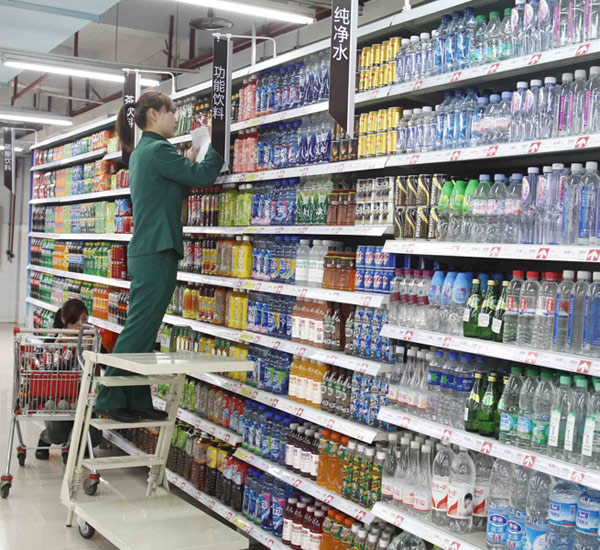 |
|
Bottles of imported water line a supermarket shelf in Xuchang city, Central China's Henan province, April 6, 2013. The premium bottled water market is booming on concerns over water safety and as consumers have more money. [Photo Geng Guoqing / Asianewsphoto] |
Two Chinese businessmen recently bought two water sources in British Columbia, Canada.
Immigration consultant Alex Liao said in an interview with Reuters last week that he had clients looking to spend at least $20 million to buy a well and set up a bottling plant to export mountain water to China.
"One of my clients is exporting – I cannot believe it – 200 container loads of mineral water from B.C. to China every single month," Liao told Reuters. "Lots of people, right now, are buying wells."
Another Chinese businessman reportedly bought another water source in Chilliwack in BC province for $17 million.
"Canada is famous for its rich and clean fresh water, which is very cheap and suitable to develop bottled-water business," said Yuan Zhanling, former economic and commercial counselor of the Consulate General of the People's Republic of China in Vancouver.
"To invest in water resources, Chinese businessmen need to be familiar with the related laws of the Canadian government and pay attention to issues such as environment and the interests of the local people, including the First Nation in Canada," Yuan suggested. "Canada often leaves Chinese consumers an impression as resourceful, natural and clean, which is an advantage of bringing Canadian bottled water to the market with vast needs, especially the emerging high-end water market."
Daniel Cheng, a 33-year-old Beijinger who often buys foreign bottled water brands, said he hasn't found any Canadian bottled water brands in the high-end supermarket in Beijing so far, but he would love to try.
"My impression of Canada is that of a country with many snow-capped mountains and clean air, so I think the water quality must be very good, especially compared to China," he said.
Wang Xi, a new mother with a nine-month-old baby, who visited Canada in 2011, said she expected to have some bottled water from Canada for making formula milk for her baby and for her dog, a growing market as well.
Having 9 percent reserve of the world's fresh water, Canada has developed a bottled water industry and numerous high-quality water sources that open to private investors.
Canadian bottled water companies must also adhere to provincial regulations when taking water at the source. Some provincial governments are reviewing their water and environment regulations to improve water management.
In Canada, each province has the authority to regulate its own water standards, which are based on national guidelines for Canadian drinking water quality.
In addition, companies which are members of the Canadian Bottled Water Association (CBWA) must adhere to standards set by the industry including an annual unannounced plant inspection which involves audits of product quality and plant operations.
China has seen a fast growing bottled-water market in the past decade, with 20 percent increase in average year-by-year.
For Chinese people, buying bottled water from supermarket instead of drinking much cheaper tap water was once a luxury and unreasonable western life style.
However since the pockets of Chinese people are becoming deeper, the bottled water industry has boomed in the last two decades.
In 1930s, Germany built the first bottled water factory in east China's Qingdao province. It was the only bottled water producer till 1987 when China released standards for bottled mineral water and encouraged domestic production.
The competition, between different producers of "purified water" and "mineral water", got fierce in 1990s. Three to four major players and hundreds of small newcomers seized the domestic bottled water market.
Foreign brands such as Dannon and Nestle entered China at the beginning of the new century in buying Chinese brands or set up factories directly.
Premium brands including Evian from France, which entered the Chinese market in 1986, were a huge success.
A report published in 2011 by Sino monitor International, a Beijing market research company, estimated that the premium bottled water market would expand at an annual rate of 80 percent over the next five years, reaching annual sales of 10 billion yuan ($1.56 billion) by 2015.
- China says DPRK leader meeting to happen when 'convenient'
- Cause of NW Chinese city odorous tap water identified
- Chinese woman stands for UN's aviation arm's elections
- Chinese FM gives press conference for NPC session
- China kicks off new inspections over top state firms
- 10,000-sq-m farm built on rooftop
- UK police detain trespasser who climbed to Parliament's roof
- Two suspects held over murder of Russian opposition leader
- A year on, what's the latest in the hunt for Flight 370?
- China asks Sri Lanka to protect interests of investors over suspended port project
- Chinese, Myanmar diplomats hold consultation on relations
- 5 dead in shooting at restaurant in Mali capital
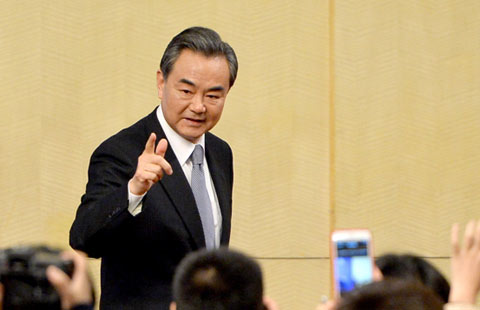
 Chinese FM gives press conference for NPC session
Chinese FM gives press conference for NPC session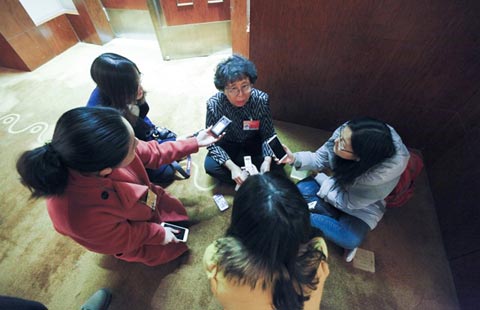
 One Minute: 'Bizarre' TV scenes and subsidies for hiring women
One Minute: 'Bizarre' TV scenes and subsidies for hiring women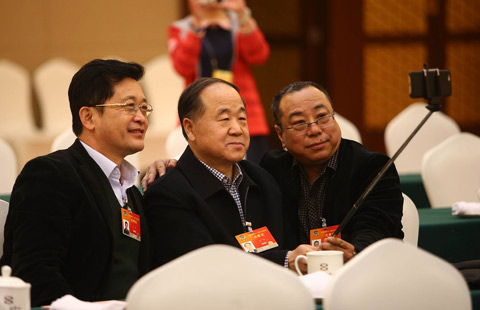
 Daily snapshots of 'two sessions' - March 7
Daily snapshots of 'two sessions' - March 7
 MH370 families remember one year on
MH370 families remember one year on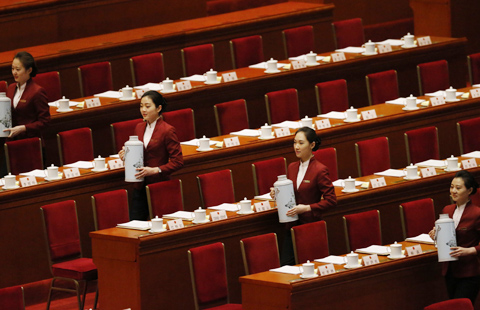
 World celebrates International Women's Day
World celebrates International Women's Day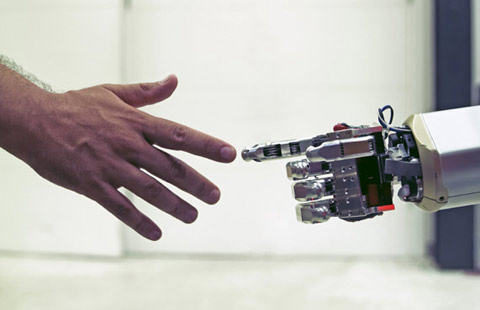
 Highlights on the Internet industry in Premier Li's work report
Highlights on the Internet industry in Premier Li's work report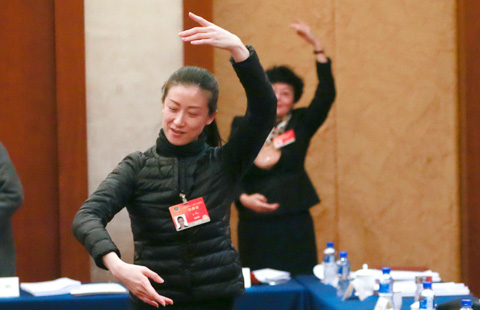
 Daily snapshots of 'two sessions' - March 6
Daily snapshots of 'two sessions' - March 6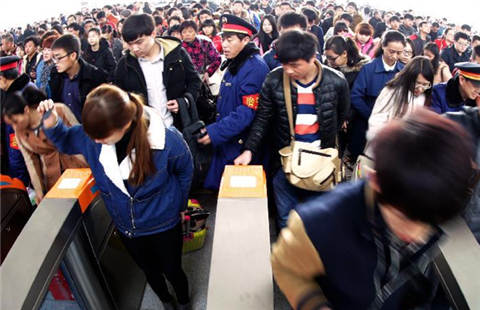
 Railway stations witness return peak across China
Railway stations witness return peak across China
Most Viewed
Editor's Picks

|

|

|

|

|

|
Today's Top News
China to speed up drafting anti-corruption law
A year on, what's the latest in the hunt for Flight 370?
China sincerely invites world leaders for WWII commemorations
Police kill black teen in US state of Wisconsin
Kerry briefs Europeans on Iran nuke talks
Don't magnify Sino-US disagreements, Wang says
Solar-powered plane prepares to fly around the world
Government plans to reform foreign investment law
US Weekly

|

|







